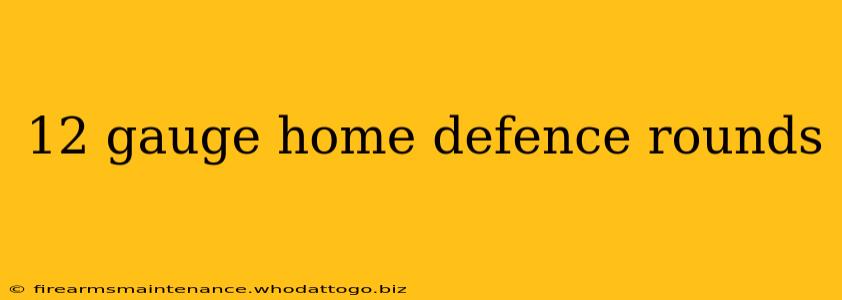Choosing the right ammunition for home defense is a critical decision, and for 12-gauge shotgun owners, the options can feel overwhelming. This guide will help you navigate the world of 12 gauge home defense rounds, focusing on factors like projectile type, energy transfer, and penetration capabilities to ensure you select the best option for your specific needs and living situation.
Understanding the Importance of Ammunition Selection
The primary goal of home defense ammunition is to stop a threat quickly and effectively, minimizing the risk of collateral damage. This means selecting rounds that offer a balance between stopping power and reduced overpenetration, a critical concern in densely populated areas or homes with thin walls. Incorrect ammunition selection can lead to dangerous consequences.
Types of 12 Gauge Home Defense Rounds:
Several types of 12 gauge ammunition are suitable for home defense, each with its own advantages and drawbacks:
1. Buckshot:
- Description: Buckshot rounds contain multiple pellets (typically 00, 000, or even larger) within a single shell. This spreads the shot pattern, increasing the chance of hitting a target at close range.
- Advantages: High stopping power at close range due to multiple projectiles. Relatively inexpensive.
- Disadvantages: Significant spread at longer ranges, reducing accuracy. High risk of overpenetration, especially with larger shot sizes like 000 buck.
2. Birdshot:
- Description: Birdshot uses smaller pellets than buckshot, making it less lethal at close range.
- Advantages: Less likely to overpenetrate than buckshot. Suitable for situations where minimizing risk of collateral damage is paramount.
- Disadvantages: Lower stopping power compared to buckshot. Generally unsuitable for serious home defense situations.
3. Slugs:
- Description: Slugs are single projectiles, often made of lead or other materials, that travel in a straight line.
- Advantages: Highest stopping power of the three types. Excellent accuracy at longer ranges.
- Disadvantages: Highest risk of overpenetration. Not ideal for close-quarters situations due to the potential for excessive penetration through walls and into neighboring rooms.
4. Reduced Recoil Rounds:
- Description: Designed to reduce the felt recoil of the shotgun, making it more manageable for smaller shooters or those sensitive to recoil.
- Advantages: Easier to handle and maintain control. Improved follow-up shot capability.
- Disadvantages: May compromise some stopping power compared to standard loads.
Factors to Consider When Choosing Ammunition:
- Your Home's Construction: If you live in an apartment or have thin walls, overpenetration is a serious concern. Smaller shot sizes like #4 buck or even specialized reduced-recoil loads should be considered.
- Your Shooting Proficiency: If you're not a skilled shooter, focusing on a round that's easy to handle and offers a larger pattern (like 00 buck) might be beneficial.
- Legal Considerations: Familiarize yourself with local laws and regulations concerning ammunition use.
Beyond the Basics: Specialized Home Defense Loads
The market offers specialized ammunition designed specifically for home defense, often featuring features like improved patterns or reduced recoil. Researching these options could further optimize your choice.
Conclusion: Responsible Ammunition Selection is Key
Selecting the right 12 gauge home defense rounds is a crucial aspect of ensuring your safety and the safety of others. By carefully considering your home environment, shooting skills, and local laws, you can choose an appropriate round that balances stopping power with reduced overpenetration. Remember, responsible gun ownership includes responsible ammunition selection and training. Always practice safe gun handling and seek professional training to ensure you're prepared for any situation.

